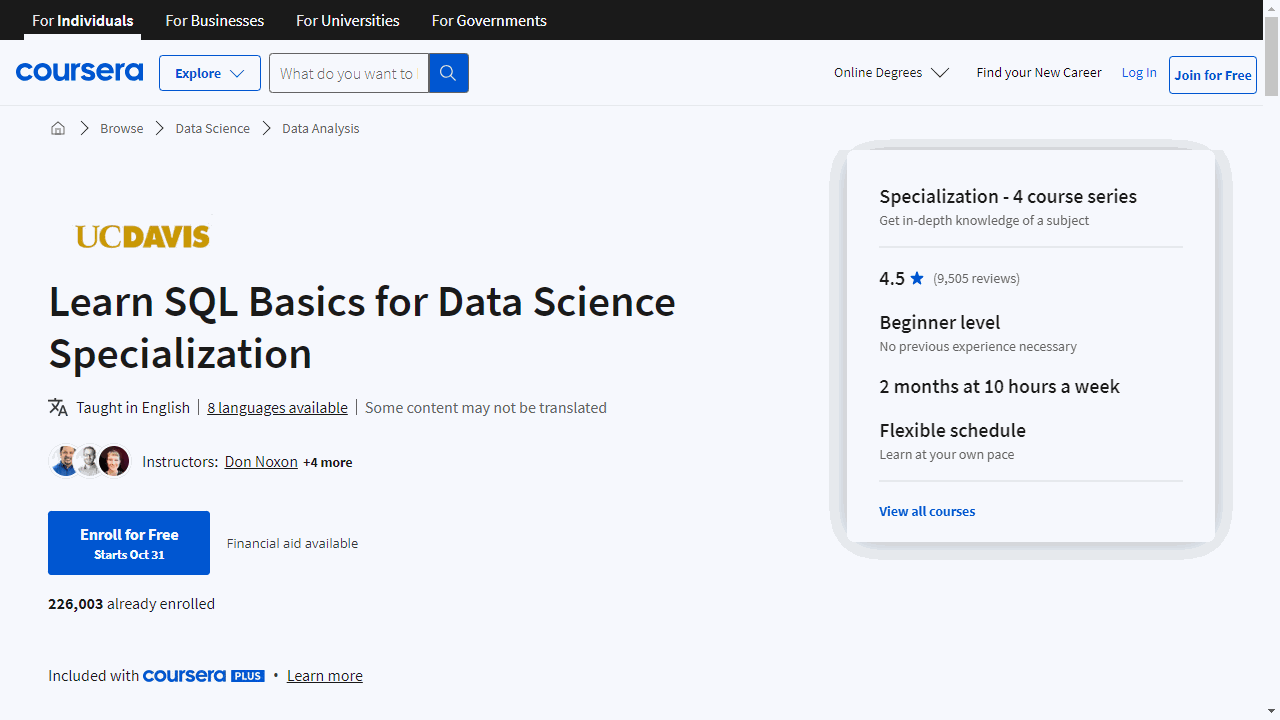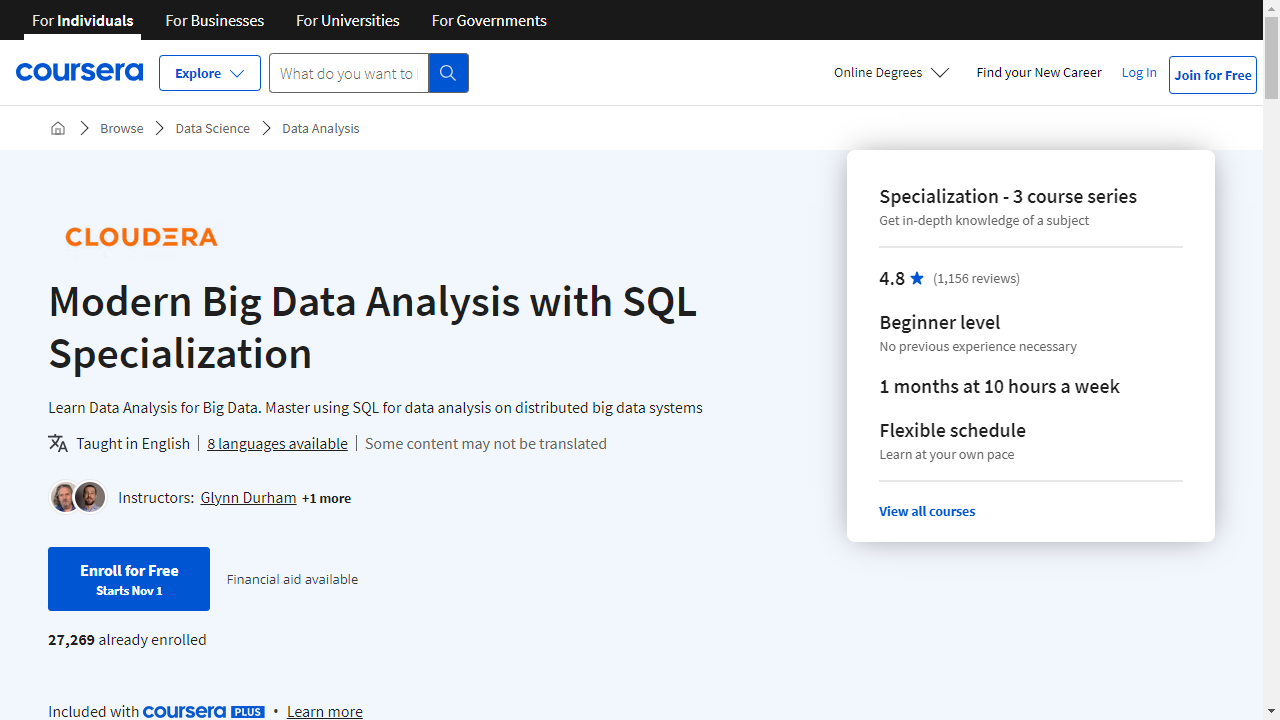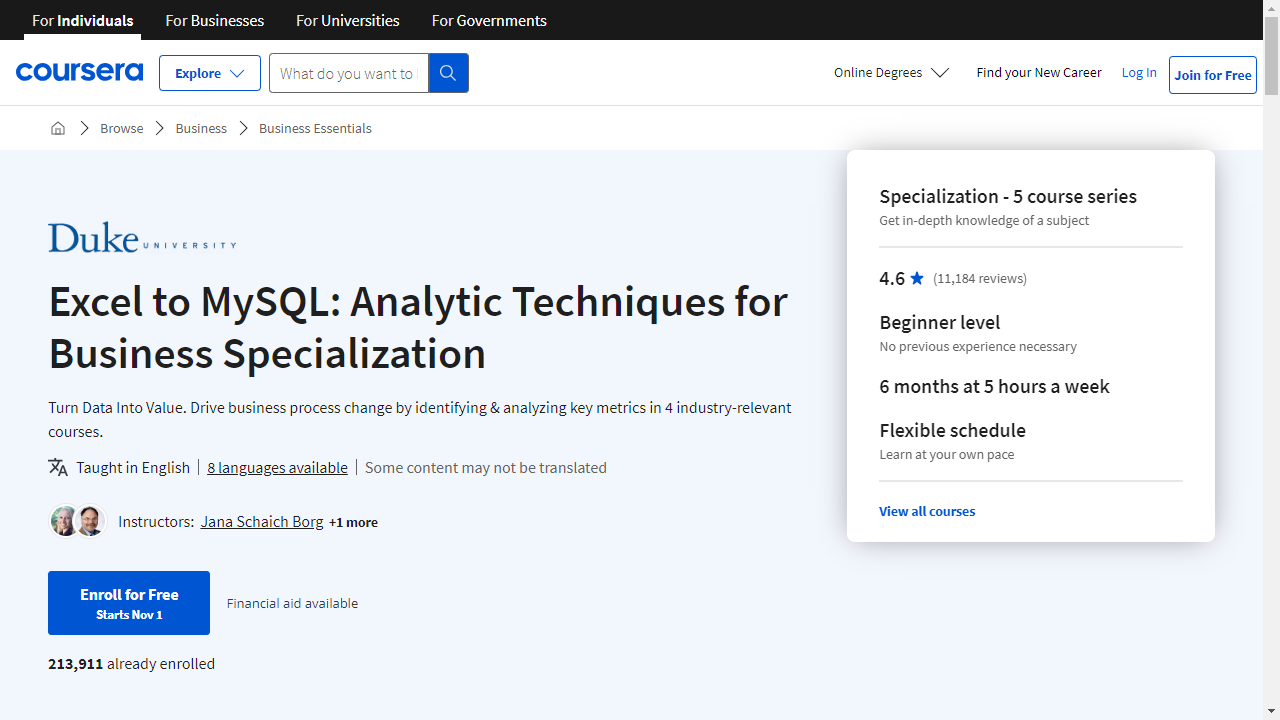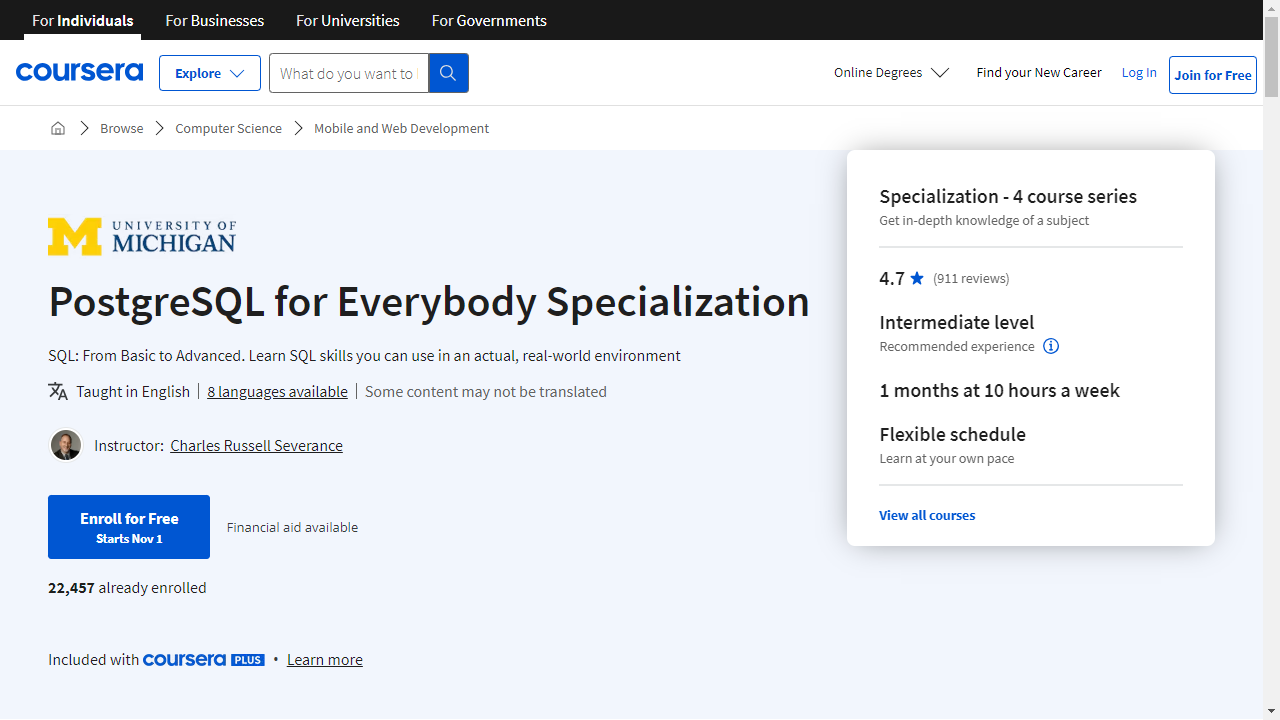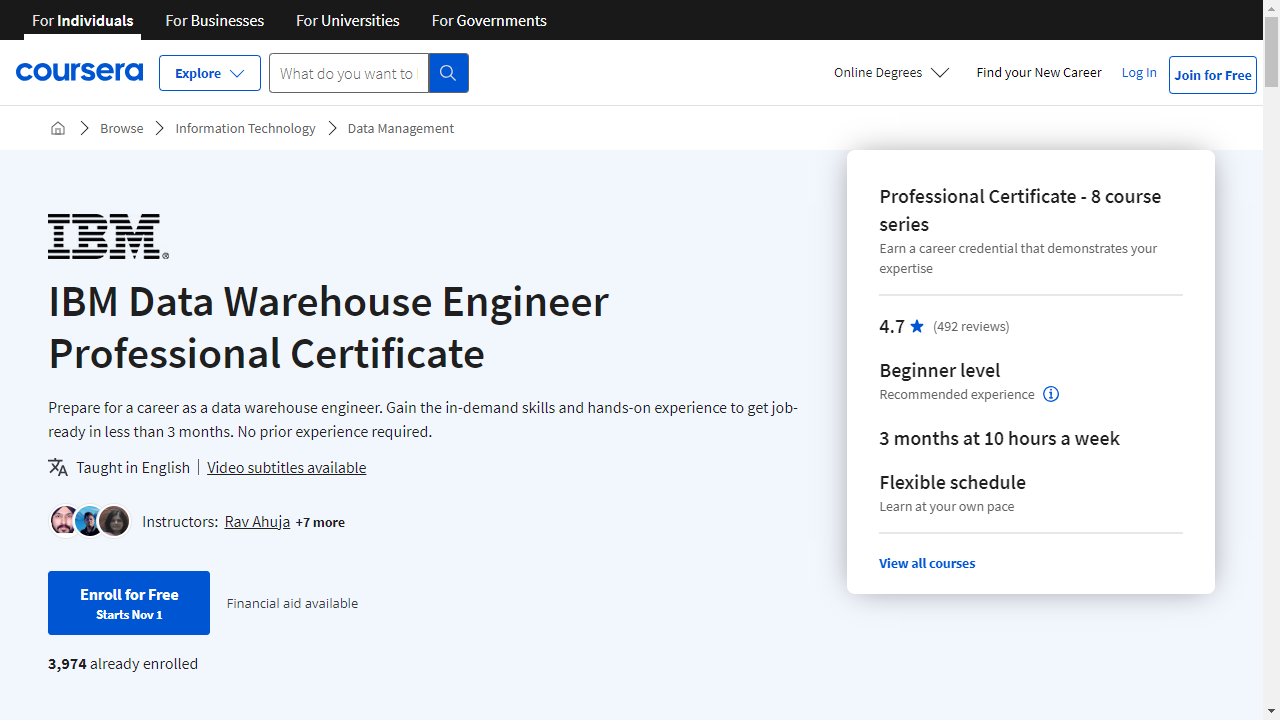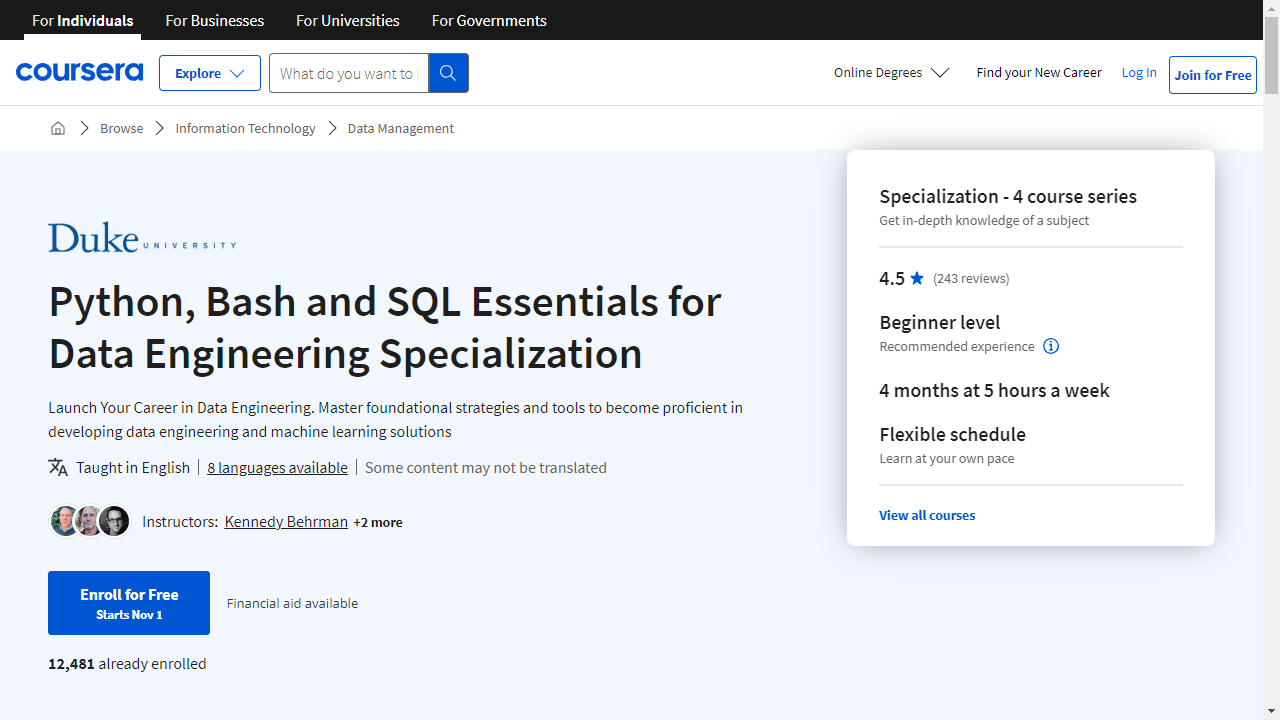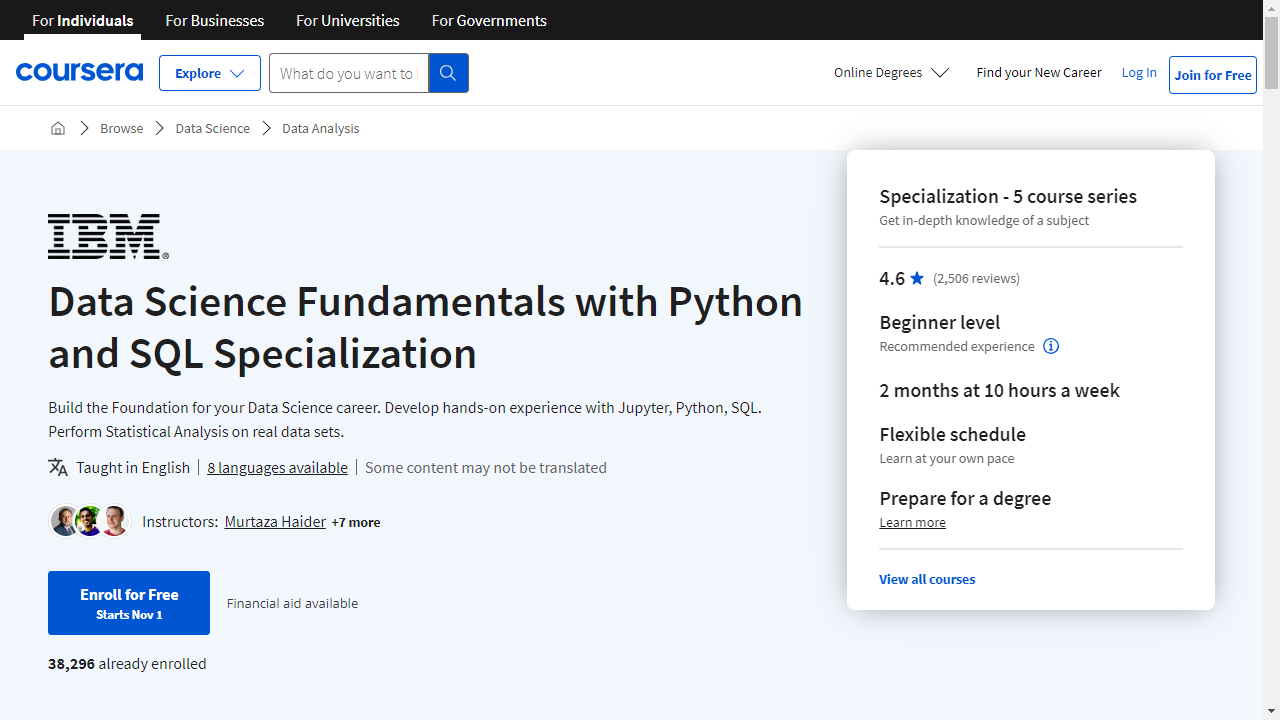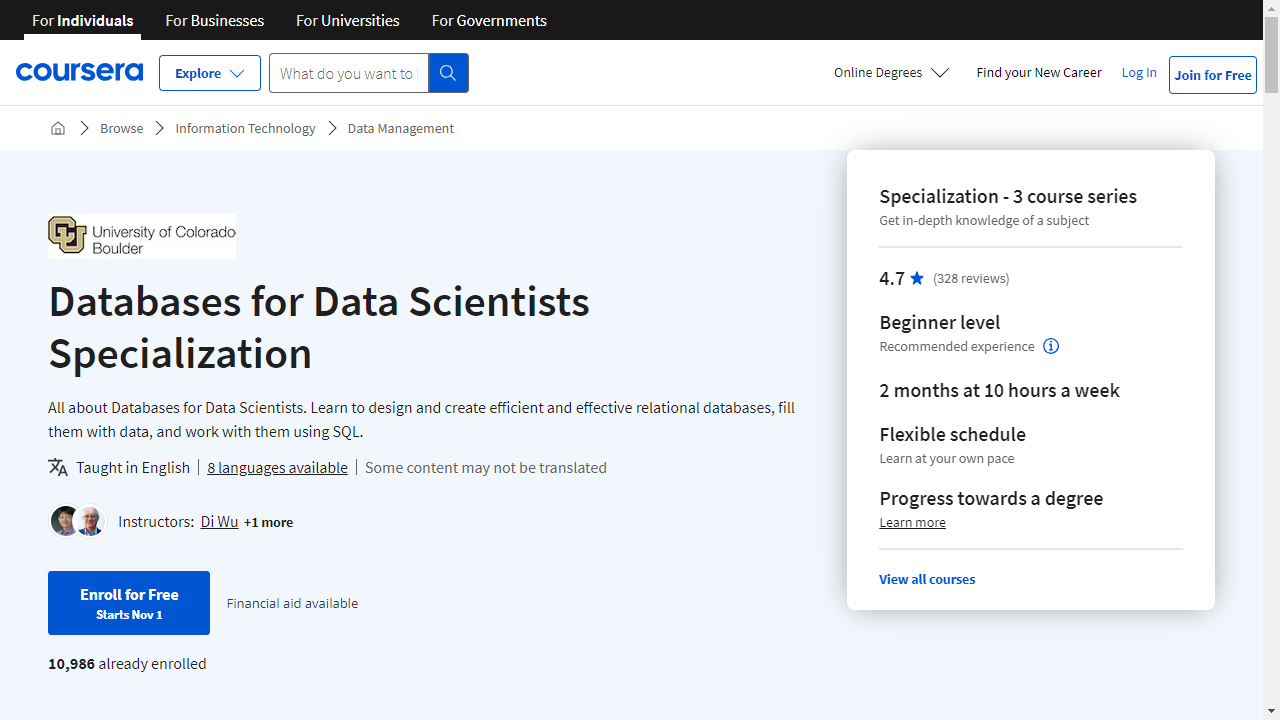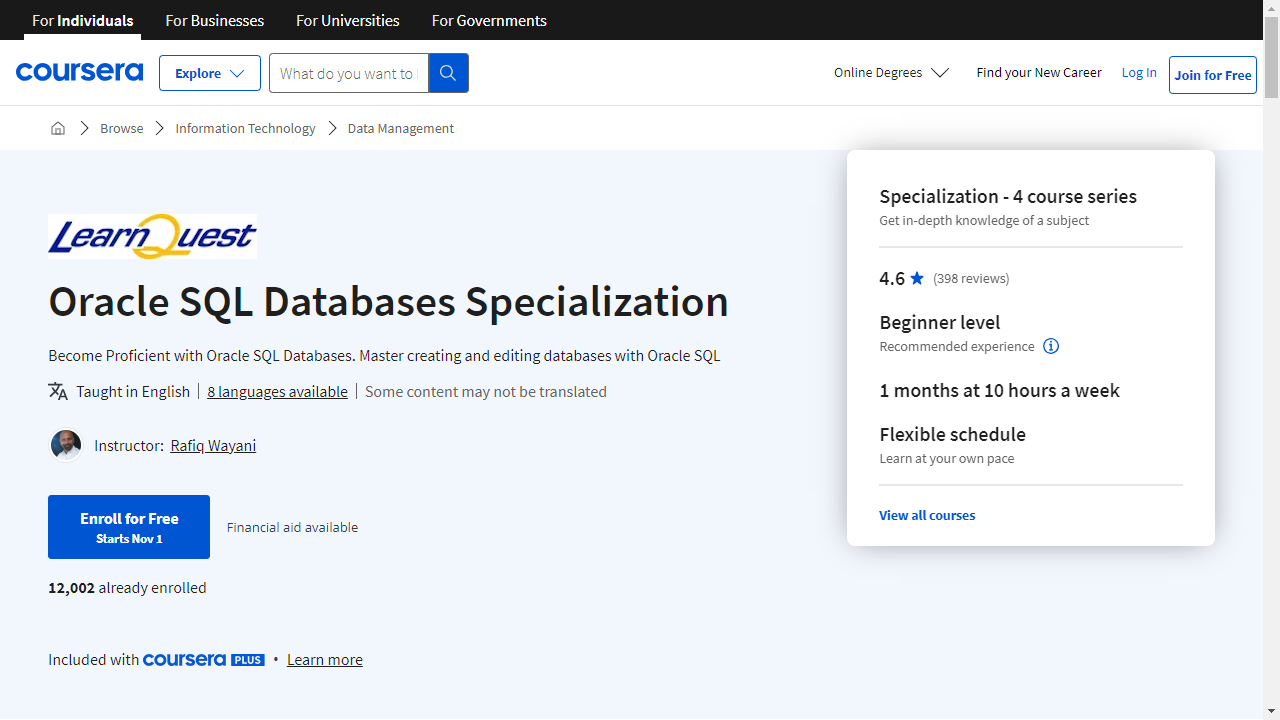Finding a good SQL course can be a real challenge, especially with so many options out there.
You want something that’s comprehensive, engaging, and taught by experts, but you also want to make sure it fits your learning style and goals.
We’ve looked at the best SQL courses on Coursera and narrowed it down to our top picks.
For the best SQL course overall, we recommend Learn SQL Basics for Data Science Specialization by UC Davis.
This specialization provides a comprehensive introduction to SQL, covering both simple and complex queries, different data types, and how to create new tables.
It’s highly rated for its comprehensiveness, easy-to-follow format, and real-world programming assignments.
But if this isn’t quite right for you, we have plenty of other options.
Keep reading for more recommendations for beginners, intermediate learners, and experts, as well as courses focusing on specific database management systems and data engineering.
Learn SQL Basics for Data Science Specialization by UC Davis
The first course, SQL for Data Science, is designed for beginners and will give you a solid foundation in SQL.
You’ll learn how to write both simple and complex queries, work with different types of data, and create new tables.
This course is highly rated with a score of 4.6 out of 5, and it’s easy to see why. It’s comprehensive, easy to follow, and provides real-world programming assignments for practice.
The second course, Data Wrangling, Analysis and AB Testing with SQL, allows you to apply the SQL skills you’ve learned to real data science case studies.
You’ll learn how to clean data, perform optimal JOIN operations, and segment and analyze data using windowing functions.
As the name implies, this course also covers A/B testing, a popular method, widely used in industry, for finding the best version of a product or service.
The third course, Distributed Computing with Spark SQL, is all about “big data”.
This course is unique as it focuses on distributed computing using Apache Spark, a widely used open-source standard for working with large datasets.
You’ll learn about Spark architecture, how to optimize Spark SQL, and how to build reliable data pipelines.
The final course, SQL for Data Science Capstone Project, gives you the opportunity to apply everything you’ve learned in a real-world context.
You’ll develop a project proposal, perform exploratory analysis, develop metrics, and present your findings.
This course is a great way to consolidate your learning and create a portfolio-worthy piece.
Modern Big Data Analysis with SQL Specialization
This specialization is a comprehensive suite of courses that will equip you with the skills and knowledge to navigate the world of large-scale datasets using SQL.
The first course, Foundations for Big Data Analysis with SQL, will teach you to distinguish between operational and analytic databases, understand how database and table design provide structures for working with data, and appreciate how the volume and variety of data affect your choice of an appropriate database system.
Next up is Analyzing Big Data with SQL.
This course dives deeper into the SQL SELECT statement and its main clauses. It focuses on big data SQL engines Apache Hive and Apache Impala, but the information is also applicable to SQL with traditional RDBMs.
You’ll learn to explore and navigate databases and tables, understand the basics of SELECT statements, and work with sorting and limiting results.
The final course, Managing Big Data in Clusters and Cloud Storage, teaches you how to manage big datasets, load them into clusters and cloud storage, and apply structure to the data for querying using distributed SQL engines like Apache Hive and Apache Impala.
You’ll learn to use different tools to browse existing databases and tables in big data systems, explore files in distributed filesystems and cloud storage, and create and manage databases and tables.
One standout feature of these courses is the learning environment.
You’ll get to download and install a virtual machine and the software to run it, which simulates the practical, real-world experience in industry. This is a unique aspect that sets these courses apart from many others.
Excel to MySQL: Analytic Techniques for Business Specialization
This specialization is good if you want a smooth transition from Excel to SQL, while also learning other data analysis skills.
The first course, “Business Metrics for Data-Driven Companies,” introduces you to the world of data analytics and how it can make any company more competitive and profitable.
You’ll learn to distinguish critical business metrics from mere data, understand the roles of different data professionals, and even score a company on its use of big data.
Next up is “Mastering Data Analysis in Excel.”
This course focuses on data-analysis concepts and methods, using Excel for calculations. You’ll design and implement predictive models, understand the importance of uncertainty in data analysis, and learn to apply important uncertainty measures in business.
The course doesn’t cover advanced Excel functionality, but it provides enough practice to make you fluent in its most commonly used business functions.
The third course, “Data Visualization and Communication with Tableau,” teaches you how to communicate the practical implications of quantitative analyses to any audience.
You’ll learn to structure your data analysis projects, create effective visualizations in Tableau, and design persuasive business “data stories.”
“Managing Big Data with MySQL” is the fourth course in the specialization.
It introduces you to the use of relational databases in business analysis. You’ll learn how relational databases work, how to use entity-relationship diagrams, and how to execute the most useful query and table aggregation statements.
By the end of this course, you’ll have a clear understanding of how relational databases work and a portfolio of queries to show potential employers.
The final course, “Increasing Real Estate Management Profits: Harnessing Data Analytics,” is a capstone project where you’ll use data analysis to recommend a method for improving profits for a real estate management company.
You’ll extract relevant data from a real estate database, implement data analysis in Excel, create a Tableau dashboard, and recommend a significant business process change based on your data analysis.
PostgreSQL for Everybody Specialization
This series of courses is designed to take you from a beginner to an advanced level in SQL and PostgreSQL, a popular open-source relational database management system.
The first course, “Database Design and Basic SQL in PostgreSQL” covers the historical design of databases and the use of SQL in the PostgreSQL environment.
You’ll learn how to create tables, define the schema of your data, and represent one-to-many and many-to-many relationships. The course also includes hands-on assignments, which are a great way to apply what you’ve learned.
Next up is “Intermediate PostgreSQL.”
This course dives deeper into SQL techniques, covering aggregation, transactions, reading and parsing CSV files, and more. You’ll also learn how PostgreSQL handles and indexes text data.
The third course, “JSON and Natural Language Processing in PostgreSQL,” is a standout.
It’s unique in that it focuses on how PostgreSQL creates and uses inverted indexes for JSON and natural language content. You’ll get to work with various sources of data, including online APIs, and build your own inverted indexes.
The final course, “Database Architecture, Scale, and NoSQL with Elasticsearch,” explores database architecture, PostgreSQL, and scalable deployment configurations.
You’ll learn about Elasticsearch NoSQL, a common NoSQL database used for high-speed search and indexing.
IBM Data Warehouse Engineer Professional Certificate
If your goal in learning SQL is to become a data engineer, then the IBM Data Warehouse Engineer Professional Certificate is a great choice.
The first course, “Introduction to Data Engineering,” provides a solid foundation in data engineering, covering everything from data structures and file formats to the roles of data professionals. The course also introduces you to various types of data repositories and big data processing tools.
Next, the “Introduction to Relational Databases (RDBMS)” course dives deeper into the world of data engineering.
You’ll gain a solid understanding of how data is stored, processed, and accessed in relational databases. The course also provides hands-on exercises, allowing you to work with real databases and explore real-world datasets.
The “SQL: A Practical Introduction for Querying Databases” course offers a comprehensive introduction to SQL, covering everything from basic CRUD operations to advanced SQL techniques.
The “Hands-on Introduction to Linux Commands and Shell Scripting” course provides a practical understanding of common Linux/UNIX shell commands, which are essential for data engineers. The course also includes hands-on labs, allowing you to practice and apply what you learn.
The “Relational Database Administration (DBA)” course is a must for anyone interested in database management. It covers everything from database optimization to security and backup procedures.
The course also includes a final project where you’ll assume the role of a database administrator, providing a real-world application of the skills you’ve learned.
The “ETL and Data Pipelines with Shell, Airflow and Kafka” course is unique in its focus on the two different approaches to converting raw data into analytics-ready data.
You’ll learn about the tools and techniques used with ETL and Data pipelines, and by the end of the course, you’ll know how to use Apache Airflow and Apache Kafka to build data pipelines.
The “Getting Started with Data Warehousing and BI Analytics” course covers everything from the design and deployment of data warehouses to the use of BI tools for data analysis. The course also includes hands-on labs, allowing you to apply what you learn.
Finally, the “Data Warehousing Capstone Project” course allows you to apply everything you’ve learned in a real-world context. You’ll assume the role of a Junior Data Engineer and tackle a data warehouse engineering problem.
Python, Bash and SQL Essentials for Data Engineering Specialization
This specialization is a comprehensive package that not only covers SQL but also Python, Bash, which are programming languages heavily used by data engineers.
The first course, Python and Pandas for Data Engineering, introduces you to Python and the powerful Pandas library for data analysis and manipulation.
The course also covers Vim and Visual Studio Code (which I use every day), two popular tools for writing software.
The second course, Linux and Bash for Data Engineering, teaches you the fundamentals of Linux necessary for data engineering tasks.
You’ll also learn how to use both Bash and zsh configurations, and develop the syntax needed to interact and control Linux.
The third course, Scripting with Python and SQL for Data Engineering, is where you’ll dive deep into SQL.
You’ll learn how to connect to databases like MySQL, run SQL queries against a real database, and even extract data from websites using scraping techniques.
The fourth course, Web Applications and Command-Line Tools for Data Engineering, is where you’ll apply everything you’ve learned. You’ll use Python, Bash, and SQL techniques to tackle real-world problems.
You’ll also learn how to use Python microservices and build a powerful command-line tool.
Data Science Fundamentals with Python and SQL Specialization
SQL is the most important language for working with data, but if you are looking for a course that goes beyond and includes Python, then this is the course for you.
The first course, Tools for Data Science, introduces you to the essential tools used by data science professionals, including Jupyter Notebooks, RStudio IDE, Git, GitHub, and Watson Studio.
You’ll get hands-on experience with these tools, learning how to run simple code in Python, R, or SQL.
The course’s focus on practical application sets it apart from others, ensuring you’re not just learning theory but also gaining valuable experience.
Next up is Python for Data Science, AI & Development.
This course is perfect for beginners, taking you from zero to programming in Python in just a few hours.
You’ll learn about Python basics, data structures, and how to use Python libraries such as Pandas, Numpy & Beautiful Soup. The course’s emphasis on real-world application, such as data collection and web scraping with APIs, is a major plus.
The third course, Python Project for Data Science, is a mini-course that allows you to apply your Python skills in a real-world scenario.
You’ll work on a project that involves extracting data, web scraping, visualizing data, and creating a dashboard.
This course is unique in that it provides you with a tangible project to add to your portfolio, showcasing your proficiency with Python and data science tools.
The fourth course, Statistics for Data Science with Python, introduces you to the basic principles of statistical methods used for data analysis.
You’ll learn about data gathering, summarizing data, displaying and visualizing data, and examining relationships between variables. As with the other courses, it offers a hands-on approach to statistical analysis using Python and Jupyter Notebooks.
Finally, the Databases and SQL for Data Science with Python course is a must for anyone looking to gain a working knowledge of SQL.
You’ll learn everything from the basics of SELECT statements to advanced concepts like JOINs. The course’s focus is on practical applications, such as building SQL queries and working with real databases on the Cloud.
Databases for Data Scientists Specialization
This series of courses is a goldmine of knowledge if you want to dive deep, offering a comprehensive understanding of not only SQL, but also databases in general.
The first course, “Relational Database Design,” guides you through the process of building a database from scratch.
You’ll learn how to create Entity Relationship Models and Diagrams, create Relational Models, and normalize a Relational Model to 3NF.
The course is highly rated, with a score of 4.6 out of 5, and it’s part of CU Boulder’s Master of Science in Data Science (MS-DS) degree, which adds to its credibility.
Next up is “The Structured Query Language (SQL)” course.
This course dives deep into the world of SQL, teaching you the origins of the language, its conceptual foundations, and how to use SQL commands to analyze data within a relational database.
It’s a highly comprehensive course, covering not only data retrieval but also the creation and maintenance of database objects.
The final course, “Advanced Topics and Future Trends in Database Technologies,” explores in-depth and advanced areas of database technologies and gives you a glimpse into the future of database software. You’ll learn about NoSQL implementations like MongoDB, Cassandra, Redis, and Neo4j.
Like the other specializations I presented here, what sets these courses apart is their practical approach.
You won’t just learn theory; you’ll practice real-life mini cases, which will make you confident and comfortable with databases and SQL.
Plus, all these courses can be taken for academic credit as part of CU Boulder’s MS-DS degree, which is a huge bonus.
Oracle SQL Databases Specialization
This specialization is designed to take you from a beginner to a proficient user of the Oracle database environment, which corresponds to 28.6% of the database market share.
As it’s very focused on Oracle, it’s not the best choice if you want to learn SQL in general, but I added it here for completeness.
The first course, Oracle Database Foundations, is designed to provide you with the foundational knowledge you’ll need to navigate the Oracle database environment. It covers everything from the types of databases to database design and architecture.
Next up is the Oracle Database Platform course.
This course introduces both GUI and command-line tools, allowing you to navigate the Oracle database environment with ease.
The third course, Oracle SQL Basics, is where you’ll start to dive into the key elements of the Structured Query Language specific to Oracle.
Finally, the Oracle SQL Proficiency course delves deeper into the Create, Alter, and Update commands, explores database relationships, and demonstrates how to use database views and SQL functions.
Also check our posts on:
